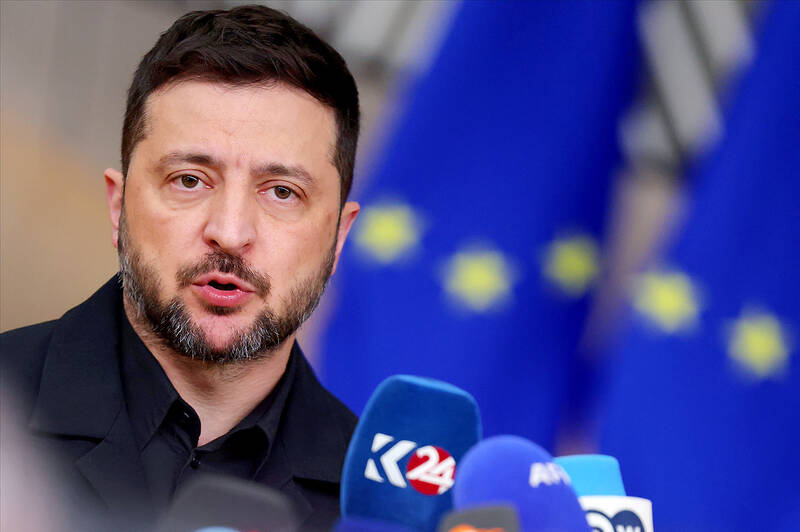The EU yesterday heaped more economic sanctions on Russia, adding to US President Donald Trump’s new punitive measures the previous day against the Russian oil industry.
Russian officials and state media dismissed the Western measures, saying they are largely ineffective.
The sanctions are intended as part of a broadened effort to choke off the revenue and supplies that fuel Moscow’s invasion of Ukraine and compel Russian President Vladimir Putin to negotiate an end to the war.

Photo: EPA
The measures are a triumph for Ukrainian President Volodymyr Zelenskiy, who has long campaigned for the international community to punish Russia more comprehensively for attacking his country.
“We waited for this. God bless, it will work, and this is very important,” Zelenskiy said in Brussels, where EU countries attending a summit announced the latest round of Russia sanctions.
Despite US-led peace efforts in the past few months, the war shows no sign of ending after nearly four years, and European leaders are increasingly concerned about the threat from Russia.
Ukrainian forces have largely held Russia’s bigger army at bay in a slow and ruinous war of attrition along a roughly 1,000km front line that snakes along eastern and southern Ukraine.
Almost daily Russian long-range strikes have taken aim at Ukraine’s power grid before the bitter winter, while Ukrainian forces have targeted Russian oil refineries and manufacturing plants.
The EU measures especially target Russian oil and gas. They ban imports of Russian liquefied natural gas into the bloc, and add port bans on more than 100 new ships in the Russian shadow fleet of hundreds of aging tankers that are dodging sanctions.
The latest sanctions bring the total number of such ships to be banned to 557.
The measures also target transactions with a cryptocurrency increasingly used by Russia to circumvent sanctions; prohibit operations in the bloc using Russian payment cards and systems; restrict the provision of artificial intelligence services and high-performance computing services to Russian entities; and widen an export ban to include electronic components, chemicals and metals used in military manufacturing.
A new system for limiting the movement of Russian diplomats within the 27-nation EU would also be introduced.
International crude prices yesterday rose more than US$2 per barrel on news of the additional sanctions.
The US sanctions against Russian oil companies Rosneft and Lukoil came after Trump said that his plan for a swift meeting with Putin was on hold because he did not want it to be a “waste of time.”
It was the latest twist in Trump’s hot-and-cold efforts to end the war as Putin refuses to budge from his demands.
However, the sanctions do not take effect for almost a month, until Nov. 21, potentially giving Putin a chance for a change of heart.

The combined effect of the monsoon, the outer rim of Typhoon Fengshen and a low-pressure system is expected to bring significant rainfall this week to various parts of the nation, the Central Weather Administration (CWA) said. The heaviest rain is expected to occur today and tomorrow, with torrential rain expected in Keelung’s north coast, Yilan and the mountainous regions of Taipei and New Taipei City, the CWA said. Rivers could rise rapidly, and residents should stay away from riverbanks and avoid going to the mountains or engaging in water activities, it said. Scattered showers are expected today in central and

COOPERATION: Taiwan is aligning closely with US strategic objectives on various matters, including China’s rare earths restrictions, the Ministry of Foreign Affairs said Taiwan could deal with China’s tightened export controls on rare earth metals by turning to “urban mining,” a researcher said yesterday. Rare earth metals, which are used in semiconductors and other electronic components, could be recovered from industrial or electronic waste to reduce reliance on imports, National Cheng Kung University Department of Resources Engineering professor Lee Cheng-han (李政翰) said. Despite their name, rare earth elements are not actually rare — their abundance in the Earth’s crust is relatively high, but they are dispersed, making extraction and refining energy-intensive and environmentally damaging, he said, adding that many countries have opted to

CONCESSION: A Shin Kong official said that the firm was ‘willing to contribute’ to the nation, as the move would enable Nvidia Crop to build its headquarters in Taiwan Shin Kong Life Insurance Co (新光人壽) yesterday said it would relinquish land-use rights, or known as surface rights, for two plots in Taipei’s Beitou District (北投), paving the way for Nvidia Corp to expand its office footprint in Taiwan. The insurer said it made the decision “in the interest of the nation’s greater good” and would not seek compensation from taxpayers for potential future losses, calling the move a gesture to resolve a months-long impasse among the insurer, the Taipei City Government and the US chip giant. “The decision was made on the condition that the Taipei City Government reimburses the related

African swine fever was confirmed at a pig farm in Taichung, the Ministry of Agriculture said today, prompting a five-day nationwide ban on transporting and slaughtering pigs, and marking the loss of Taiwan’s status as the only Asian nation free of all three major swine diseases. The ministry held a news conference today confirming that the virus was detected at a farm in Wuci District (梧棲) yesterday evening. Authorities preemptively culled 195 pigs at the farm at about 3am and disinfected the entire site to prevent the disease from spreading, the ministry said. Authorities also set up a 3km-radius control zone